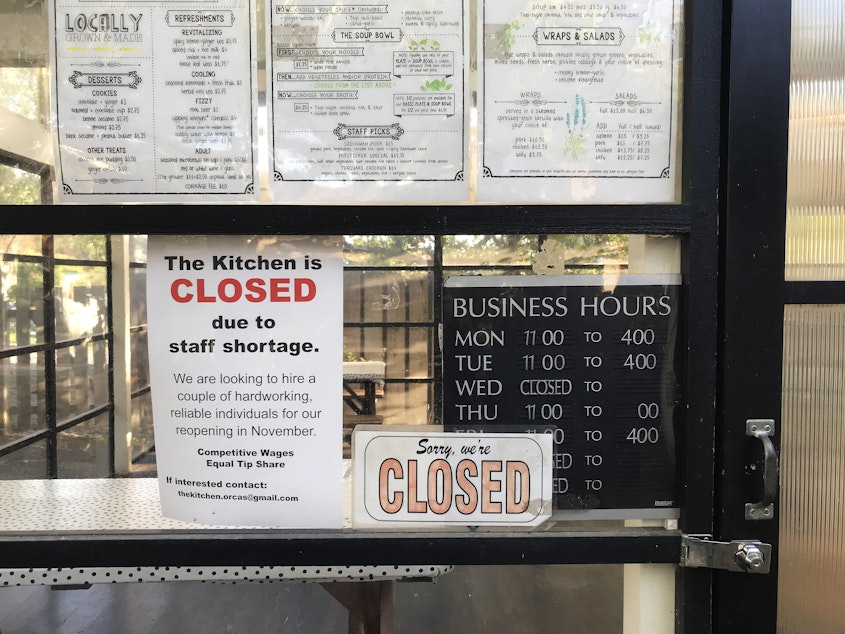Tourism is booming in our small towns. But can locals afford to enjoy it?

This month we visited a few of our most popular Washington tourist destinations. We wanted to know: how has the pandemic reshaped tourism? What changes has the pandemic, and tourism broadly, brought to some of our most beautiful places?
Today, we break down what we learned and dive into one of the biggest themes we heard about: how living in our small towns is becoming more and more untenable.
For a lot of people, places like Leavenworth and Orcas Island are getaways -- good for relaxation and fun. But it's easy to overlook the cost paid by folks who live and work in these communities.
Take Leavenworth for example, where Shay Helligso is part of the over 80 percent of Leavenworth employees who don't live in town. Or Orcas Island, seasonal workers like Jammal Williams often turn to living in cars, tents, or yurts to afford living where they're employed.
As second homes, vacation rentals, and Air BnBs propagate in some of our most beautiful towns, both workers and officials are left to wonder how local economies can balance a booming tourism industry while providing abundant and affordable housing options.
Is it possible to achieve that balance, or will the towns situated in our most beautiful places always be unaffordable? And while tourism has overwhelmed some places, have other towns seen a similar surge?
Soundside talked to David Blandford, Executive Director of State of Washington Tourism, about statewide trends and how long a broad recovery in state tourism will take.
We then hear from Catherine Veninga and Rachel Elfenbein, community research and advocacy coordinators at Community Council in Walla Walla, about broader problems in rural housing availability, and how small towns are struggling broadly -- tourism or not.
Our series concludes with a conversation with Lance George, director of research and information at the Housing Assistance Council, who tells us how localities across the country are tackling the issue of tourism and housing.
We asked you: how has tourism changed your town? Here's what you told us.
- We've seen "waves" of tourism activity in Arlington. Mainly due to local surrounding areas such as Skagit and North King County visitors coming to small town, downtown Arlington when the weather is nice over a weekend, and folks just wanting and needing to get out of their homes
- We live in Seattle! Tourism is the impetus for all the big sports venues which now surround us. Of course at the moment this is not helpful. I expect that the lack of tourism during the pandemic is putting a huge strain on both the city and the investors in those enormous institutions. You never hear about it so this should be interesting at some point. I like sharing Seattle. But we need to have balance.
- The community is definitely torn about the 'streeteries' in downtown Edmonds. Some people want to keep them as they provide a safer option for dining out. Others want their pecking spots back. And city council can decide how much is a fair price to provide permits. Lots of heated debates on local Facebook groups.
- I live on Vashon Island. Tourism went crazy here the last couple of years. Year one of the pandemic brought tons of people just trying to get out of their house but our island is full of old people so it was very concerning. It's continued into year two and now we are vaccinated and used to it. In year one, there was a huge sign as you drove onto the island that said "please mask, average age 55." Our community was very concerned with so many visitors.
- I live on Bainbridge island. For the most part we saw typical levels of tourists, many ferry walk on people. It caused a lot of anxiety for locals regarding safety because our levels of cases were very very low the whole time and have bet high vaccination rates. The small business owners who line the Main Street have had to hold a really tough safety line. Also having Jay Inslee from here, with family still on the island, led to really extreme anti policy protests over the summer that were scary, frankly.
- I run a small company leading history walking tours around Seattle. Music focused mainly. The pandemic has obviously changed who and how many people are coming to Seattle. Foreign visitors used to be my prime target audience. Now it is only domestic tourists who come looking for my tours. I'm not sure when international visitors will return. But I know that's there is pent-up demand to visit Seattle. I worry that curious locals have been priced out of this market. I am certain higher volume tourism industries or towns with more of a reliance upon tourists are struggling. When we return to a new normal is an open question.
- In Bellingham, Trader Joe's and Costco are so different with or without Canadian shoppers. We've really noticed the open and closed borders the last 2 years!






